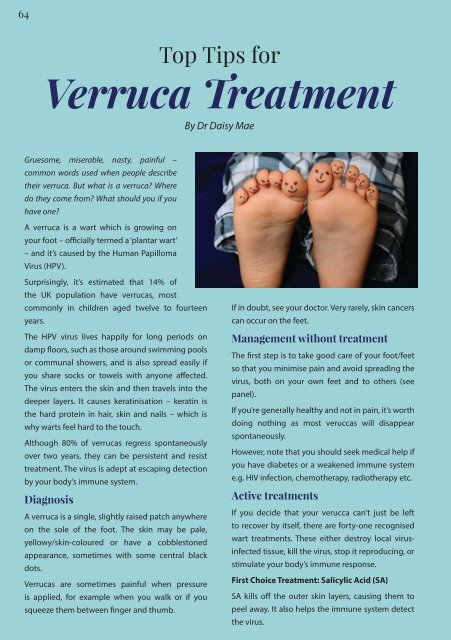Local Life - Wigan - March 2020
Wigan's FREE local lifestyle magazine.
Wigan's FREE local lifestyle magazine.
You also want an ePaper? Increase the reach of your titles
YUMPU automatically turns print PDFs into web optimized ePapers that Google loves.
64<br />
Top Tips for<br />
Verruca Treatment<br />
By Dr Daisy Mae<br />
Gruesome, miserable, nasty, painful –<br />
common words used when people describe<br />
their verruca. But what is a verruca? Where<br />
do they come from? What should you if you<br />
have one?<br />
A verruca is a wart which is growing on<br />
your foot – officially termed a ‘plantar wart’<br />
– and it’s caused by the Human Papilloma<br />
Virus (HPV).<br />
Surprisingly, it’s estimated that 14% of<br />
the UK population have verrucas, most<br />
commonly in children aged twelve to fourteen<br />
years.<br />
The HPV virus lives happily for long periods on<br />
damp floors, such as those around swimming pools<br />
or communal showers, and is also spread easily if<br />
you share socks or towels with anyone affected.<br />
The virus enters the skin and then travels into the<br />
deeper layers. It causes keratinisation – keratin is<br />
the hard protein in hair, skin and nails – which is<br />
why warts feel hard to the touch.<br />
Although 80% of verrucas regress spontaneously<br />
over two years, they can be persistent and resist<br />
treatment. The virus is adept at escaping detection<br />
by your body’s immune system.<br />
Diagnosis<br />
A verruca is a single, slightly raised patch anywhere<br />
on the sole of the foot. The skin may be pale,<br />
yellowy/skin-coloured or have a cobblestoned<br />
appearance, sometimes with some central black<br />
dots.<br />
Verrucas are sometimes painful when pressure<br />
is applied, for example when you walk or if you<br />
squeeze them between finger and thumb.<br />
If in doubt, see your doctor. Very rarely, skin cancers<br />
can occur on the feet.<br />
Management without treatment<br />
The first step is to take good care of your foot/feet<br />
so that you minimise pain and avoid spreading the<br />
virus, both on your own feet and to others (see<br />
panel).<br />
If you’re generally healthy and not in pain, it’s worth<br />
doing nothing as most veruccas will disappear<br />
spontaneously.<br />
However, note that you should seek medical help if<br />
you have diabetes or a weakened immune system<br />
e.g. HIV infection, chemotherapy, radiotherapy etc.<br />
Active treatments<br />
If you decide that your verucca can’t just be left<br />
to recover by itself, there are forty-one recognised<br />
wart treatments. These either destroy local virusinfected<br />
tissue, kill the virus, stop it reproducing, or<br />
stimulate your body’s immune response.<br />
First Choice Treatment: Salicylic Acid (SA)<br />
SA kills off the outer skin layers, causing them to<br />
peel away. It also helps the immune system detect<br />
the virus.


















